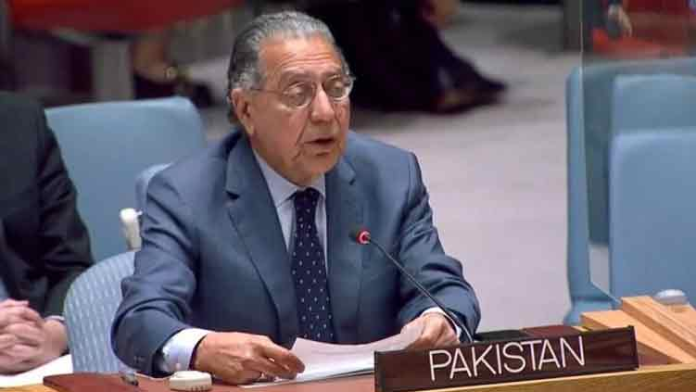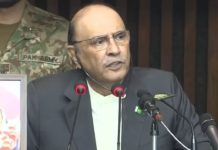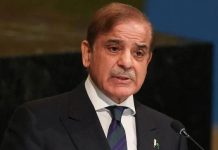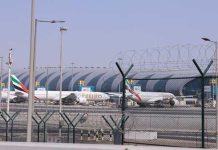UNITED NATIONS, JAN 22 (APP/DNA):Pakistan Tuesday told the UN Security Council that it stands ready to share its counter-terrorism experience with African countries to back their efforts towards restoring peace and stability on the continent now that the terrorism epicentre has shifted from the Middle East to the Central Sahel region of sub-Saharan Africa.
“For the past four decades, Pakistan has been at the forefront of the fight against global terrorism,” Ambassador Munir Akram, permanent representative of Pakistan to the United Nations, said during the 15-member Council’s high-level meeting focused on strengthening counter-terrorism in Africa, convened by Algeria, the Council president for January.
Pakistan, he said, desires to strengthen its cooperation with the brotherly African states, while highlighting the country’s success in suppressing al-Qaeda and other terrorist groups.
“Within the Security Council and in conjunction with the UNOCT (United Nations Office of Counter-Terrorism), Pakistan stands ready to share its counter-terrorism experience with our African partners and to help establish the necessary institutional structures and provide capacity-building for Africa’s endeavor to restore sustainable peace and stability.”
Opening the debate, UN Deputy Secretary-General Amina Mohammed said that Africa tragically remains the epicentre of global terrorism, and more action is required to implement international commitments to combat this scourge,,
She emphasized that the Council has a critical role in supporting African Union (AU) counter-terrorism initiatives, grounded in African leadership and solutions.
Ms. Mohammed said terrorism is the most significant threat to peace, security and sustainable development across Africa today, and presented sobering statistics outlining its devastating toll.
Despite continued efforts by member states, sub-Saharan Africa now accounts for nearly 59 per cent of all terrorism-related deaths globally.
In his remarks, Ambassador Akram said that while combating terrorism, Pakistan has paid a heavy price, with over 80,000 casualties and enormous damage to the country’s economy.
“After successfully suppressing al-Qaeda and other terrorist groups within our borders, Pakistan continues to confront terrorist groups – like the TTP (Tehreek-i-Taliban Pakistan) and Daesh – operating from safe havens across our borders,” the Pakistani envoy added.
While al-Qaeda’s “core” was decimated in Afghanistan — largely due to Pakistan’s efforts, he said several of al-Qaeda’s subsidiaries have emerged elsewhere, including in North Africa and Sub-Saharan Africa. Daesh was decimated in Syria and Iraq, but its franchises have emerged in Afghanistan and the Sahel. The Monitoring Team of the 1267 al-Qaeda and Daesh Sanctions Committee details the global threat posed by these terrorist groups and their affiliates, it was pointed out.
“We must address the terrorist threat together, through a comprehensive and coordinated strategy based upon the global counter-terrorism strategy,” Ambassador Akram said.
“We are all in this fight together. “
In this regard, the Pakistani envoy proposed a regional approach for establishing an effective security architecture for countering terrorism.
To this end, he said, the Security Council must agree expeditiously on the financing of the AU Missions, taking into account how its enforcement missions can be assisted – with relevant equipment, training and supplementary UN counterparts – to achieving their objectives.
The Pakistani envoy also urged the AU and its sub-regional organizations to explore partnerships with other regional organizations, such as the League of Arab States and the Organization of Islamic Cooperation (OIC).
Also, he called for reviewing the efficiency and impact of the Security Council’s several sanctions regimes, noting that these have often proved to be “blunt instruments” that contribute little to containing prevalent terrorist threats while impeding the socio-economic development of the countries concerned.
“We must address the new cyber tools of terrorism, including the dark web and cryptocurrencies which are being utilized increasingly for radicalization campaigns, incitement to violence, terror financing, propaganda and disinformation through the social media,” Ambassador Akram said, adding that the underlying reasons and root causes of terrorism in Africa must be addressed. These include poverty, economic hardships, poor governance, small arms proliferation, the presence of organized criminal gangs, illegal economies, drug trafficking, resource exploitation, and repeated external interventions.
He pointed out that Pakistani military contingents have participated in efforts to promote stability in Africa since the 1960s serving in UN peacekeeping missions in the Democratic Republic of Congo (DRC), Central African Republic, Mali, Sudan, and South Sudan.

















